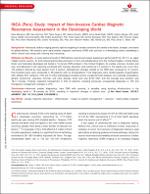| dc.contributor.author | Menacho, Katia | |
| dc.contributor.author | Ramirez, Sara | |
| dc.contributor.author | Segura, Pedro | |
| dc.contributor.author | Nordin, Sabrina | |
| dc.contributor.author | Abdel-Gadir, Amna | |
| dc.contributor.author | Illatopa, Violeta | |
| dc.contributor.author | Benedetti, Giulia | |
| dc.contributor.author | Boubertakh, Redha | |
| dc.contributor.author | Abad, Pedro | |
| dc.contributor.author | Rodriguez, Bertha | |
| dc.contributor.author | Medina, Felix | |
| dc.date.accessioned | 2021-11-03T19:19:11Z | |
| dc.date.available | 2021-11-03T19:19:11Z | |
| dc.date.issued | 2018-09 | |
| dc.identifier.citation | Journal of the American Heart Association. 2018;7(17) | es_PE |
| dc.identifier.uri | https://hdl.handle.net/20.500.12959/1983 | |
| dc.description.abstract | Background: Advanced cardiac imaging permits optimal targeting of cardiac treatment but needs to be faster, cheaper, and easier for global delivery. We aimed to pilot rapid cardiac magnetic resonance (CMR) with contrast in a developing nation, embedding it within clinical care along with training and mentoring.
Methods and Results: A cross‐sectional study of CMR delivery and clinical impact assessment performed 2016–2017 in an upper middle‐income country. An International partnership (clinicians in Peru and collaborators from the United Kingdom, United States, Brazil, and Colombia) developed and tested a 15‐minute CMR protocol in the United Kingdom, for cardiac volumes, function and scar, and delivered it with reporting combined with training, education and mentoring in 2 centers in the capital city, Lima, Peru, 100 patients referred by local doctors from 6 centers. Management changes related to the CMR were reviewed at 12 months. One‐hundred scans were conducted in 98 patients with no complications. Final diagnoses were cardiomyopathy (hypertrophic, 26%; dilated, 22%; ischemic, 15%) and 12 other pathologies including tumors, congenital heart disease, iron overload, amyloidosis, genetic syndromes, vasculitis, thrombi, and valve disease. Scan cost was $150 USD, and the average scan duration was 18±7 minutes. Findings impacted management in 56% of patients, including previously unsuspected diagnoses in 19% and therapeutic management changes in 37%.
Conclusions: Advanced cardiac diagnostics, here CMR with contrast, is possible using existing infrastructure in the developing world in 18 minutes for $150, resulting in important changes in patient care. | |
| dc.format | application/pdf | es_PE |
| dc.language.iso | eng | es_PE |
| dc.publisher | American Heart Association | es_PE |
| dc.relation.uri | https://www.ahajournals.org/doi/10.1161/JAHA.118.008981 | |
| dc.rights | info:eu-repo/semantics/openAccess | es_PE |
| dc.rights.uri | https://creativecommons.org/licenses/by/4.0/ | es_PE |
| dc.subject | Resonancia magnética cardíaca rápida | es_PE |
| dc.subject | Resonancia magnética cardíaca | es_PE |
| dc.subject | Impacto en el manejo del paciente | es_PE |
| dc.subject | Eficacia | es_PE |
| dc.subject | Cardiac magnetic resonance | |
| dc.subject | Effectiveness | |
| dc.subject | Impact on patient management | |
| dc.subject | Outcome | |
| dc.subject | Rapid cardiac magnetic resonance | |
| dc.title | INCA (Peru) Study: Impact of Non-Invasive Cardiac Magnetic Resonance Assessment in the Developing World | es_PE |
| dc.type | info:eu-repo/semantics/article | es_PE |
| dc.subject.ocde | https://purl.org/pe-repo/ocde/ford#3.02.04 | es_PE |
| dc.publisher.country | PE | es_PE |
| dc.identifier.doi | https://doi.org/10.1161/JAHA.118.008981 | |






